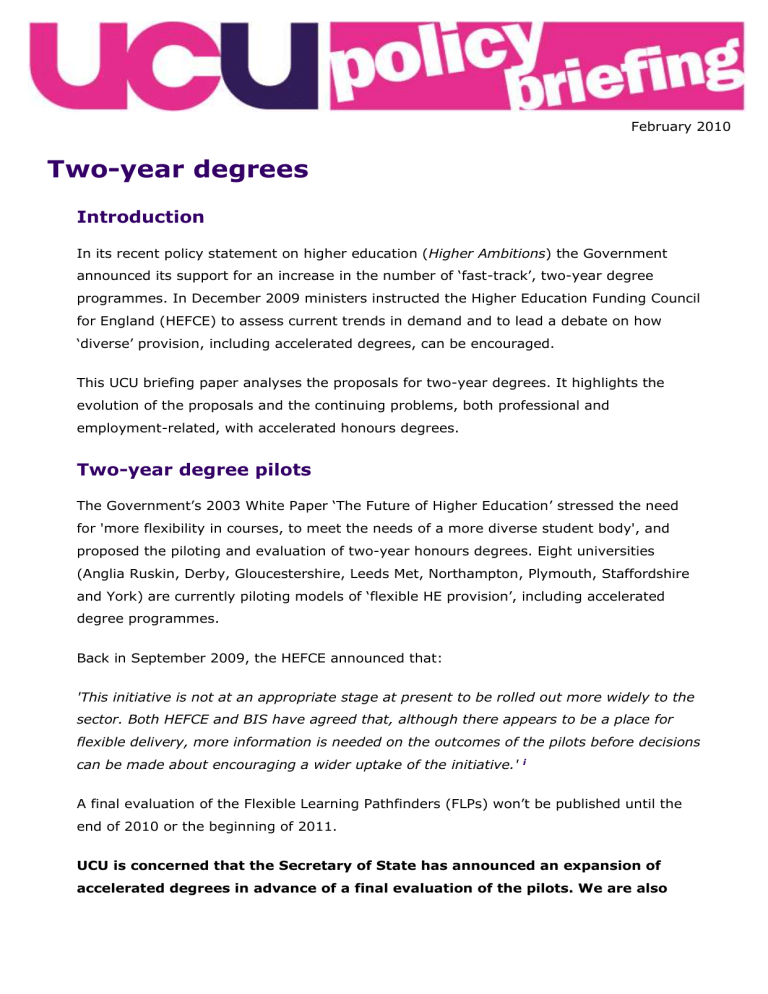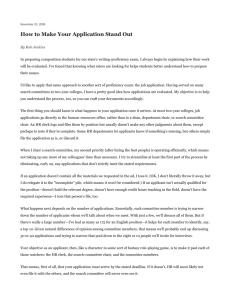UCU policy briefing: Two

February 2010
Two-year degrees
Introduction
In its recent policy statement on higher education (Higher Ambitions) the Government announced its support for an increase in the number of ‘fast-track’, two-year degree programmes. In December 2009 ministers instructed the Higher Education Funding Council for England (HEFCE) to assess current trends in demand and to lead a debate on how
‘diverse’ provision, including accelerated degrees, can be encouraged.
This UCU briefing paper analyses the proposals for two-year degrees. It highlights the evolution of the proposals and the continuing problems, both professional and employment-related, with accelerated honours degrees.
Two-year degree pilots
The Government’s 2003 White Paper ‘The Future of Higher Education’ stressed the need for 'more flexibility in courses, to meet the needs of a more diverse student body', and proposed the piloting and evaluation of two-year honours degrees. Eight universities
(Anglia Ruskin, Derby, Gloucestershire, Leeds Met, Northampton, Plymouth, Staffordshire and York) are currently piloting models of ‘flexible HE provision’, including accelerated degree programmes.
Back in September 2009, the HEFCE announced that:
'This initiative is not at an appropriate stage at present to be rolled out more widely to the sector. Both HEFCE and BIS have agreed that, although there appears to be a place for flexible delivery, more information is needed on the outcomes of the pilots before decisions can be made about encouraging a wider uptake of the initiative.' i
A final evaluation of the Flexible Learning Pathfinders (FLPs) won’t be published until the end of 2010 or the beginning of 2011.
UCU is concerned that the Secretary of State has announced an expansion of accelerated degrees in advance of a final evaluation of the pilots. We are also
Two-year degrees, UCU, February 2010 concerned that the flexible learning agenda appears to be driven by economic
rather than simply educational objectives. We believe that it is no accident that the
Government have announced an expansion of two-year degrees at the same time as major cuts in public funding. A similar experiment in the 1990s (the Extended Academic Year) was piloted during a period in which the unit of resource for higher education decreased in real terms year on year indefinitely.
Is there student demand for two-year degrees?
It is difficult to know whether there is sufficient student demand for a new two-year honours degree. In the UK the only prolonged experience of the accelerated honours degree has been at Buckingham University (an institution with less than 900 students).
More worryingly, a review of flexible learning in 2006 found 'very limited interest' in fast track degrees and a 'strong preference for three-year over two-year degrees' among Year
12 students considering HE.
ii In addition, the post-1992 universities – the most likely part of the higher education sector to provide two-year degrees – remain sceptical about the level of demand for accelerated degrees. For example, in the view of Professor Les Ebdon, the chair of Million +, 'Two-year degrees work for some students, who do not have to fund
themselves with part-time jobs', [but] 'they will only be offered by a limited number of universities for a small number of courses.' iii The experience of foundation degrees is that significant additional funding is required to help stimulate demand for new types of HE qualifications.
Will two-year degrees improve access to higher education?
It has been suggested that two-year degrees will be particularly attractive to working class students and therefore are a key part of the widening participation agenda. This is based on the assumption that working class students are more ‘debt averse’ and place less emphasis on the ‘consumption’ or cultural benefits of an undergraduate education than their middle class counterparts. However, a recent evaluation of the introduction of fasttrack degree programmes reveals that 'evidence in support of such views is currently thin.' iv A review of the accelerated programmes at the University of Luton and Southampton
Institute in the late 1990s was similarly cautious:
'What the experiment does not show, however, is that a summer semester helps to reduce social exclusion from higher education.' v
2
Two-year degrees, UCU, February 2010
Are two-year degrees financially viable for universities?
We are sceptical about the financial viability of the current two-year degree programmes.
Recent initiatives (for example, the HEFCE ‘flexible learning pathfinders’) are dependent upon additional public funding. In the words of the Higher Education Academy:
'The economic viability of FLP projects was possible because of strategic development funding from HEFCE. Once this funding has ended, the economic sustainability of flexible learning provision is much less certain.' vi
A 2009 review of the HEFCE pilots by colleagues at Staffordshire University also reported
'deep concerns about the implications of the current funding model for sustaining the financial viability of Fast-Track degrees.' vii Similarly, a 2006 report on demand for flexible learning suggested that 'two-year degrees could only be financially feasible for an HEI if annual fees were raised significantly above their current level and this would require legislative changes.' viii
Are two-year degrees compatible with the Bologna process?
We are concerned about the potential for two-year degree programmes to encourage
‘cramming to complete the course’. Fast track programmes will make it harder for students to combine study with periods of reflection, critical thinking and a ‘deep approach’ to learning. We have already seen a significant expansion in the numbers of universities having to put on ‘remedial’ English and Maths classes in the first year of a three year undergraduate degree. A major expansion of accelerated degrees is likely to aggravate these trends.
A significant expansion of two-year honours degrees is also likely to be incompatible with the UK’s commitments under the Bologna Process (i.e. the specified 3 year minimum length of first cycle (undergraduate) degrees). For example, the UK Europe Unit have said that 'it is not at all clear that European partners will be prepared to recognise a two-year bachelor degree as equivalent, in terms of learning outcomes (or credit points) to a three or four year continental first cycle qualification.' Similarly, the Chief Executive of QAA told the Education and Skills Committee that fast-track degrees would be 'very difficult […] to sell' across the European Higher Education Area (EHEA).
ix
3
Two-year degrees, UCU, February 2010
Are two-year degrees likely to promote good working conditions for staff?
Previous studies of two-year degree programmes have identified 'significant day-to-day
operating and logistical difficulties', and 'very significant opposition to summer semester teaching on the part of the majority of academic staff'.
x As a trade union we continue to have concerns about the employment consequences of ‘fast-track’ degrees, including the employment of casual staff to teach on ‘third semesters’. Additional teaching requirements in the summer are also likely to have a detrimental impact on staff workloads. For the majority of academics, the summer period is taken up with research, exam resits, admissions, postgraduate teaching and supervision, updating courses and reading lists for the next academic year, and dealing with relentless bureaucracy. Recent studies by UCU of occupational stress in HE have consistently shown workloads of 50 plus hours a week for full-time academic staff.
Finally, there are equality issues that need to be addressed:
'Certain equality and diversity groups within HE staff (for example, carers) might potentially be affected by the flexible learning initiative if they were required to teach at times when traditionally teaching does not take place (for example, at weekends or during
the traditional summer teaching-free period).' xi
Conclusion
UCU believes that there are significant educational and employment-related problems with two-year ‘fast-track’ undergraduate degrees. For these reasons we call on the
Government to review its plans for a major expansion in this area.
End notes i
Higher Education Funding Council for England (HEFCE), Flexible learning pathfinders: sector impact assessment , 2009, page 8 http://www.hefce.ac.uk/learning/flexible/FLP_SIA.pdf
ii
Demand for flexible and innovative types of higher education , Report to HEFCE by SQW Ltd and Taylor Nelson Sofres,
January 2006, paragraph 14, http://www.sqw.co.uk/file_download/24 iii Professor Les Ebdon, quoted in Richard Garner, ‘Mandelson: do your degree in two- years’, Independent, 23 December
2009 http://www.independent.co.uk/news/education/education-news/mandelson-do-your-degreein-two--years-1848107.html
4
Two-year degrees, UCU, February 2010 iv
Peter Davies, Chris Howard and Kim Slack, An evaluation of the introduction of fast-track (2 year) degree programmes: final report , Staffordshire University, 2009, page 6 http://www.staffs.ac.uk/schools/business/iepr/docs/FastTrackEvaluationFinalReport.pdf
v
Changing times
– the extended academic year experiment,
Report to the HEFCE by Segal Quince Wicksteed Ltd,
December 1999, paragraph 48 http://www.hefce.ac.uk/pubs/hefce/1999/99_70.htm
vi Higher Education Academy , Flexible Learning Pathfinders: a review of the pilots’ final and interim reports, page 2. vii
An evaluation of the introduction of fast-track (2 year) degree programmes: final report , page 40. viii Demand for flexible and innovative types of higher education, page 42. ix
House of Commons Education and Skills Committee, The Bologna Process: Fourth Report of Session 2006-07, April
2007, page 52 http://www.publications.parliament.uk/pa/cm200607/cmselect/cmeduski/205/205.pdf
x Changing times, paragraphs 35, 39.
xi
Flexible learning pathfinders: s ector impact assessment , page 5.
5





